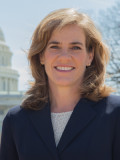
 By General Counsel Holly Hollman
By General Counsel Holly Hollman
What does the presidency of Donald J. Trump mean for religious liberty? Specific church-state issues rarely arose during the presidential campaign, and the Baptist Joint Committee found nothing prior to Trump’s candidacy to indicate that he has given much thought to the matter.
That said, we face serious challenges. In his first two weeks, President Trump issued an Executive Order that included a religious prioritization for refugees, he made a promise to change an IRS rule that would open the door to church electioneering, and the administration is reportedly considering an Executive Order that, according to the leaked version, would purport to protect religious liberty while advancing a narrow and incomplete view of the term.
With each new administration, we expect the president’s influence on religious liberty through policy initiatives, appointments and statements that inevitably will shape the public’s understanding. Here are three areas to watch:
1. Trump has not asserted a defined vision of religious freedom that would lead to particular policies. He has not affirmed the American tradition of religious exemptions or articulated a commitment to the separation of church and state. It is not yet clear what his priorities will be. During the campaign, he made only a few statements about positions in this area.
At press time for Report from the Capital, there continued to be rumors of an Executive Order with “religious liberty” in the title. The leaked draft order includes language mirroring legislation that did not make it through Congress last year, including the First Amendment Defense Act and the “Russell Amendment.” FADA is one of several pieces of legislation introduced last Congress that purports to resolve some conflicts between LGBT protections and the rights of organizations and individuals with religious beliefs against same-sex marriage. The “Russell Amendment” refers to a controversial amendment proposed in last year’s National Defense Authorization Act that would have authorized government contractors to discriminate in hiring based on religion while using taxpayer funds. The defense bill was passed without that provision.
2. Trump appointments throughout the executive branch will certainly affect religious liberty, based on each official’s views and commitment to strong constitutional values. His nominees for attorney general, secretary of state and secretary of education all had to answer questions related to religious liberty during their confirmation hearings. There has been no word yet on who he will name to head the White House Office of Faith-based and Neighborhood Partnerships and what direction that office may take under his presidency. He also has an opportunity to name an ambassador for international religious freedom (a post last held by Rabbi David Saperstein).
Most significantly, he will appoint federal judges. President Trump has said that he wants to appoint justices and judges in the mold of the late Justice Antonin Scalia, which is not reassuring for religious liberty advocates. Scalia is known in religious liberty circles as the author of the decision that eviscerated the Free Exercise Clause (Employment Division v. Smith) and for having a weak view of the Establishment Clause that would allow government to favor religion (at least monotheism).
3. As a candidate, Trump made vague references to attacks on religious freedom and said he would be a champion for Christians. He referred to the potential of our country if we worked together “as one people, under one God, saluting one flag.” He asserted that when he is president we will say “Merry Christmas.” Such statements can erode the public’s understanding of religious freedom. Most worrisome are some of Trump’s statements regarding Muslims. No matter the policy details, rhetoric singling out for detrimental treatment a group of people based on religion harms religious liberty.
Putting aside where the blame lies, the presidential election has left our country deeply divided. A great deal of work is needed across a number of important issues. Religious liberty is a treasured American ideal with a long history of bipartisan support, at least with regard to the major principles. Our first priority is working to ensure understanding and continued support.
As Baptists and Americans, we recognize that all have the right to religious liberty, and we owe that freedom to our forebears who fought for the separation of church and state. We believe that strong protections for free exercise and no establishment are essential, and our mission will continue to guide our work and direct our activities, just as it has through presidential transitions over the past eight decades. As always, the BJC is watching closely, working with allies and listening to concerns to find common ground. With your continued support, we will engage the new administration and Congress in various ways and continue to lift our voice for religious liberty for all.
Note: This is an updated version of a column previously published online. Click here for the original article.
From the January/February 2017 edition of Report from the Capital. You can also read the digital version of the magazine or view it as a PDF.




